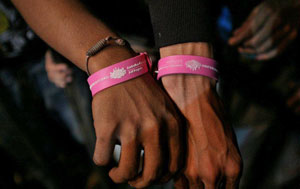The horrifying nature and the global scope of human trafficking and Australian programs to combat the crime have been highlighted at a United Nations Day event in Melbourne.
AusAID First Assistant Director General, East Asia Division, Rod Brazier, joined representatives from World Vision Australia, Child Wise, STOP THE TRAFFIK and The Age in a public forum about human trafficking organised by the United Nations Association of Australia Victoria Division.
The event included a screening of Not my life, a documentary film by Oscar nominated director Robert Bilheimer that depicts the global scale of the effects of human trafficking.
The International Labour Organization estimates that 20.9 million people are victims of forced labour globally. Almost a quarter of these are trafficked into situations of forced sexual exploitation. The majority of trafficking victims are from developing countries where livelihood options are limited and institutions weak. This heightens the vulnerability of victims.
The potential for people to fall victim to traffickers increases in times of global financial instability, and is exacerbated by the continued strong demand for cheap labour in Asia. This demand is met by the vast numbers of people seeking opportunities to migrate for work in order to improve living standards for themselves or their families.
In Asia, it is estimated 700,000 people are trafficked annually. Men are often trafficked into construction work and the fishing sector, women and girls are often trafficked into the sex industry and domestic work. Women are increasingly being trafficking for labour exploitation.
People and communities become vulnerable to traffickers and exploitative employers for many reasons including poverty, lack of employment opportunities, inadequate or unenforced labour laws and regulations, poor education, gender inequality and other cultural factors.
Australia's responses to human trafficking in East Asia are designed to reflect these contemporary realities of human trafficking and see to end the conditions that allow these practices to flourish.
Preventing trafficking
Consecutive regional programs have strengthened the capacity of criminal justice systems of governments in South East Asia to identify and prosecute traffickers, and to improve the treatment of victims.
The Asia Regional Trafficking in Persons Project and its predecessor the Asia Regional Cooperation to Prevent People Trafficking project are some of the longest running and comprehensive donor-funded criminal justice sector anti-trafficking interventions in the world.
Through these projects, Australia helped train more than 8,100 police, judges and prosecutors in the investigation and prosecution of human trafficking crimes. The approach has helped to advance cooperation and keep trafficking in persons on the agendas of countries throughout South East Asia.
With Australia's support, ASEAN has become a leader in criminal justice responses to trafficking by developing common standards and resources that are uniting the region in the fight against exploitation.
AusAID and the International Labour Organization are assisting vulnerable migrant workers and their families in six countries by preventing labour exploitation, raising awareness of exploitative practices and developing alternative livelihood options.
The TRIANGLE (Tripartite Action to Protect Migrants in the Greater Mekong Sub-region from Labour Exploitation) project aims to encourage legal and safe migration, strengthen labour protection policies and their implementation, and provide better support services for migrant workers.
AusAID is partnering with the United Nations Office on Drugs and Crime and Interpol, and assisted by the Australian Federal Police, to prevent the commercial sexual exploitation of children in the Mekong sub-region.
Project Childhood trains local law enforcement agencies and increases regional and international cooperation. It also works with World Vision Australia to increase awareness in vulnerable communities, government and tourism companies through public campaigns, training and telephone hotlines.
Through a partnership with USAID to support MTV's End Exploitation and Trafficking (EXIT) campaign, AusAID is helping to raise awareness, shift attitudes and behaviour and combat human trafficking in key countries including Thailand, Philippines, Cambodia, Vietnam, Indonesia and Malaysia.

